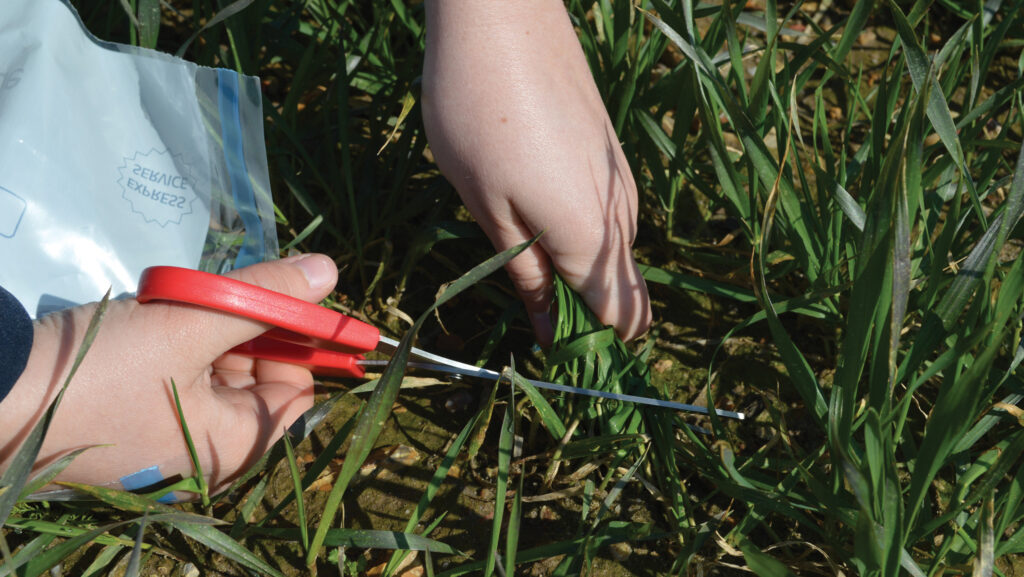Groundswell 25: Why regen agronomy is a specialist skill
 © MAG/David Jones
© MAG/David Jones Agronomy for a regenerative farming system often needs greater attention to detail and extra time, so farmers must be prepared to pay for it, visitors to Groundswell were told.
Whether it’s conducting various tests, interpreting sap analysis results or understanding soil microbial communities, the fee paid must reflect that these are skilled and specialist jobs, pointed out Ed Brown, head of farming at Wildfarmed.
“As we move forwards with regenerative agronomy, there’s more to it than just applying the principles of regenerative agriculture, reducing the use of artificial inputs and then sitting back to relax,” he explained.
“That’s especially the case with crop nutrition.”
See also: How Wilts estate’s ‘practical regen’ approach supports yields
Ed admitted that he went out “all guns blazing” when he first started advising on how to develop a regenerative farming system.
“I’m more pragmatic and risk averse now. It can go wrong if you do it too quickly.”
For Oxfordshire farmer Ben Adams, bringing in diversity has been a key step in changing the family farm’s rotation and preparing the business for the future.
“All of our crops are variety blends now and I’ve made good use of the Sustainable Farming Incentive [SFI] to increase diversity as much as possible, through the use of companion and cover crops,” he said.
“That’s helped to reduce our reliance on inputs, build carbon in the soils and make the system more resilient.”
Three additional factors
Having applied the main principles and seen promising results, there are now three additional factors that Ben believes must be right.
“The first is that timeliness is everything. That applies just as much to drilling dates as it does to getting the sheep moved off the cover crops at the optimum time.”
His second point was drainage. “Nothing will help if your drainage is poor. I
“If the water can’t get off the fields and your ditches aren’t working, no amount of soil organic matter will do all of that job for you.”
His final factor is what he called “footsteps in the field”.
“Get out there regularly and you will notice things. Observation is an important part of this way of farming.”
Independent agronomist Chris Taylor agreed that observation is an essential skill – as the system is at risk of stalling if agronomic challenges can’t be overcome.
“Exiting a grass ley to go no-till is a case in point,” he saidd.
“Farms were having difficulties getting this to work, especially where there was a wireworm population.”
Using a six- to eight-week catch crop of buckwheat ahead of drilling wheat has been successful and helped to suppress the wireworm, he revealed.
“Another solution is to follow the grass ley with a winter bean crop where we still have the chemistry for grassweed control.”
Cover crops have also needed tweaking as their use has expanded, he continued.
“They were becoming a weed burden in certain situations and were slowing things down by suppressing soil biology.”
Addressing the carbon-to-nitrogen ratio has helped put that right, noted Chris.
“Well-grown cover crops of the right species composition are now working very well ahead of maize, as are maize crops grown following rye.
The allelopathic effect of rye is really helping with weed control.”
Specialist agronomist help
Suffolk grower James Bucher, who started to change his farming system in 2018, said he wouldn’t have been able to make the progress he has without the help of a specialist agronomist.
“Change is hard,” he stressed.
“I needed the guidance of someone who understood what we were aiming for, rather than someone who needed to sell us products, so I have been working with Ben Taylor-Davies since 2021.”
As a result, lots of inputs have been removed from the system and nature has returned to the fields, he reported.
No fungicides, insecticides, plant growth regulators or seed dressings are used, while nitrogen use is down to about 60kg/ha.
“My experience is that if you want to get rid of fungicides, you need to grow blends and make maximum use of companion crops,” he said.
“We now have companions with everything – wheat and clover, oilseed rape and buckwheat or vetch, rye and vetch, Carlin peas and triticale.”
He has also reduced the costs of running a very diverse system by growing his own cover crop seed.
“My main concern now is the future of the SFI. The payments have helped as we have made changes – not everything works first time and you have to be prepared for some trial and error.”
